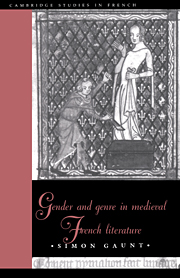Book contents
- Frontmatter
- Contents
- Acknowledgements
- List of abbreviations
- Introduction
- 1 Monologic masculinity: the chanson de geste
- 2 The knight meets his match: romance
- 3 Troubadours, ladies and language: the canso
- 4 Saints, sex and community: hagiography
- 5 Genitals, gender and mobility: the fabliaux
- Conclusion
- Notes
- Bibliography
- Index
- CAMBRIDGE STUDIES IN FRENCH
2 - The knight meets his match: romance
Published online by Cambridge University Press: 24 August 2009
- Frontmatter
- Contents
- Acknowledgements
- List of abbreviations
- Introduction
- 1 Monologic masculinity: the chanson de geste
- 2 The knight meets his match: romance
- 3 Troubadours, ladies and language: the canso
- 4 Saints, sex and community: hagiography
- 5 Genitals, gender and mobility: the fabliaux
- Conclusion
- Notes
- Bibliography
- Index
- CAMBRIDGE STUDIES IN FRENCH
Summary
It has been a commonplace in medieval studies since the last century that courtly literature simultaneously ‘discovers’ the individual, woman and love. These discoveries were viewed as a positive departure in western civilization, particularly for women. To quote Rita Lejeune, one of the foremost medievalists of the post-war period: ‘on tombera d'accord, je suppose, pour confirmer le rôle essentiel de la femme dans le développement de la littérature française des XIIe et XIIIe siècles’; thus she writes of women ‘l'amour courtois, cette grande valeur spirituelle, n'est pas leur création, mais il a été conçu pour elles’. In this vein of criticism, romance's ostensibly progressive, ‘courtly’ treatment of women is compared favourably with that of the epic. But is romance good for women? Is ‘courtly love’ a spiritual value and was it conceived for women as Lejeune suggests?
The traditional reading of romance's apparent idealization of women has not gone unchallenged in recent years. Jean-Charles Huchet, for instance, offers a sophisticated re-evaluation of romance: through love and women, he argues, romance articulates a new, more complex model of subjectivity (see Le Roman médiéval). Huchet's work situates an engagement with femininity at the core of romance, but in so doing (though he does not make the point himself), it paradoxically focuses attention on masculinity. This is because since all surviving romances from the twelfth and thirteenth centuries are as far as we know male authored, ‘women’, or more accurately femininity in these texts, is a metaphor men use to construct their own subjectivity.
- Type
- Chapter
- Information
- Gender and Genre in Medieval French Literature , pp. 71 - 121Publisher: Cambridge University PressPrint publication year: 1995
- 1
- Cited by



